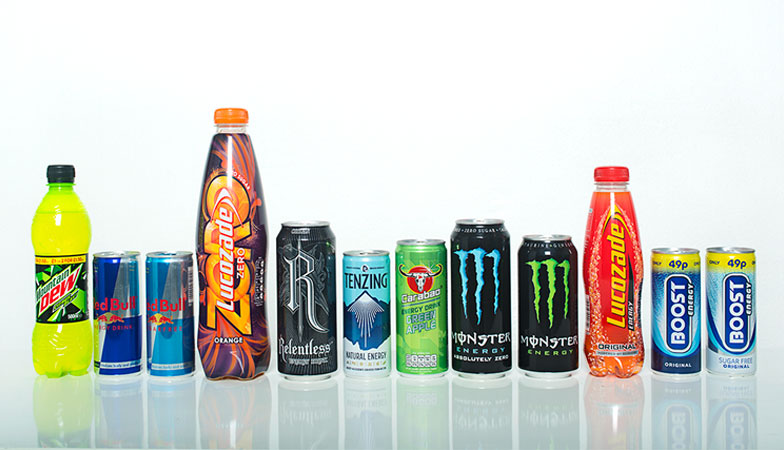Energy drinks, which are packed with sugar and artificial flavours and colourings, could be banned for children, following government proposals. Healthista set out to find a natural alternative
Recent reports reveal that the government is proposing an energy drinks ban for children. The sale of energy drinks could be prohibited in England to anyone under the age of 18; this comes in light of the damaging effects energy drinks have on children’s health. Scotland, Northern Ireland and Wales have been allowed to implement their own bans.
Research has found that young people in the UK are the highest consumers of energy drinks in the whole of Europe. Too much consumption of energy drinks could lead to various health issues, such as obesity, tooth decay, hyperactivity and sleep problems.
The ban would apply to drinks containing 150mg of caffeine or more per litre.
Sugar, sugar and more sugar
Sugar, sugar, sugar. It’s the word and substance on everybody’s lips and it’s hiding in plain sight in everything from ketchups to baked beans.
One place it doesn’t hide however is in energy drinks, with some containing a staggering 20 teaspoons of sugar per can.
Whether it’s from lack of sleep, mile-long to-do lists or pushing through exercise you can’t deny the need for the occasional energy drink
One thing is certain though, you can’t deny most people need more energy – whether it’s from lack of sleep, mile-long to-do lists or when we’re pushing through exercise. So something that can deliver it, be that pill, potion or indeed drink, is bound to be popular.
It’s certainly the case for energy drinks. Consumed regularly by one in five British households, the global market for them is growing. A Mintel report from 2016 found that global sales in 2015 reached a staggering 8.8 billion litres and the market grew by a massive 29 per cent.
But how healthy are energy drinks really? And is there anything out there that can pass as properly natural, energising and hydrating?
Getting around the sugar tax
Now, thanks to the implantation of a sugar tax many energy drinks manufacturers are rethinking their formulations to contain less sugar.
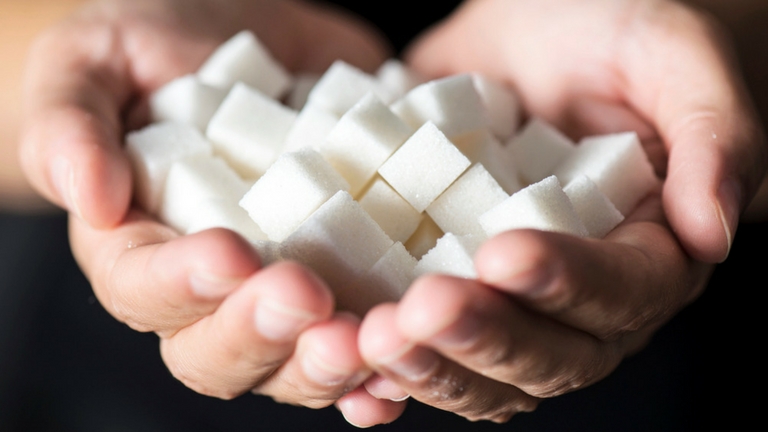
Moreover, as we become more and more aware of the effects of too much sugar on our health – from its proven link with Type-2 diabetes, obesity and even cancer – many of us are choosing low or no sugar options.
But when it comes to energy drinks, most on offer right now contain lots of sugar or artificial sweeteners paired with barely pronounce-able artificial ingredients.
Are there any energy drinks that contain only natural ingredients? Healthista set out to find out.
Under the rules of the new levy, from April 6th, 2018, drinks that are more than five per cent sugar will face an 18p levy per litre, while those containing more than eight per cent sugar will be hit with a 24p-per-litre levy.
Most energy drinks that are not labelled sugar-free are around 11-16 per cent sugar but one survey in 2015 by Action on Sugar found that some contain up to 20 teaspoons of sugar.
Are there any energy drinks that contain all natural ingredients
But while the goal of the sugar tax legislation is of course to make people drink more healthily and live more healthy lives, when it comes to energy drinks many brands are evading the tax without making their products any healthier.
Some are taking out the sugar and replacing it with fruit sugars, which are not taxed. They avoid the tax but the the sugar content stays exactly the same. But sugar is sugar, whether it comes from fruit, cane or beets.
The problem with artificial sweeteners
Others are taking out all or part the sugar content in their drinks and replacing it with artificial sweeteners like aspartame, sucralose and Acesulfame K (Ace-K).
But such artificial sweeteners not only continue to nurture a sweet tooth (so you think you drink sugar when you actually don’t, increasing your cravings) researchers are also raising questions about their long-term effects on our health.
‘There isn’t a great deal of evidence that switching to artificial sweeteners will make a great deal of difference,’ TV medic Dr Michael Moseley told the BBC Radio 4 Today programme last week.
‘Its great for your teeth, the bugs in the mouth don’t like them but the bugs in your gut do and in about half of people, sweeteners cause inflammation in the gut. That is not a good thing.
‘We don’t really know the effects they are having’.
Moseley also mentioned a large meta-analysis from Cambridge university that concluded that while yes, too much sugar is bad for you in terms of Type-2 diabetes and obesity risk, replacing sugar with artificial sweeteners is not necessarily the answer. ‘
The jury is still out on the effects of artificial sweeteners,’ Moseley concluded.
Indeed, we don’t know what effects artificial sweeteners have on our bodies long term. In fact, amongst some health experts the tide is turning toward the idea that using artificial sweeteners to replace all the sugar in our diets may do more harm than good – or at the very least, have long-term effects that many of us are unaware of.
One study from Case Western Reserve University published in March this year fed mice with the gut illness Crohn’s Disease the artificial sweetener sucralose or six weeks and they found a worsening of those patients’ gut inflammation.
 Not so good for weight loss
Not so good for weight loss
Even if you’re opting for artificial sweeteners for weight loss alone, some of the latest research suggests there may not be any point.
One study published last year in the journal PLOS One found that the artificial sweetener Acesulfame-K (or Ace-K which is found in Red Bull Sugar Free and Lucozade Energy Original), had negative effects on the gut bacteria of mice and encouraged weight gain.
In a further analysis published last year in QJM: An International Journal of Medicine, researchers analysed eleven studies and found a significant association between obesity and the consumption of both high-sugar soft drinks and those containing artificial sweeteners.
Furthermore, a systematic review of randomised controlled trials (RCTs) looking at the effects of artificial sweeteners concluded that, ‘Evidence from RCTs does not clearly support the intended benefits of non-nutritive [artificial] sweeteners for weight management, and observational data suggest that routine intake of non-nutritive sweeteners may be associated with increased BMI and cardiometabolic risk. Further research is needed to fully characterize the long-term risks and benefits of nonnutritive sweeteners.’
What’s actually in them?
But quite aside from the artificial sweeteners they contain, what else are we consuming when we down such functional drinks in the pursuit of more energy?
From glucose syrup to thickeners, colours and flavours, most energy drinks contain a number of ingredients that are usually artificially sourced.
And while their short-term energy giving effects are obvious, the long term effects of such ingredients – from gut health to obesity – are largely still unknown.
The soft drinks industry operates a voluntary code which requires a warning on labels that energy drinks are not suitable for children and should not be promoted or marketed to those under 16.
With this in mind, ’It may be time more of us starting looking at ingredients on labels in the same way as we scour those on the foods we consume’, says Rick Hay a nutritionist and lecturer in weight management at the College of Naturopathic Medicine.
In 2011, three researchers from the University of Texas Health Science Center at Houston and the University of Queensland in Australia examined the contents of energy drinks and their review of all the studies in the scientific literature was published in November 2011 in The Mayo Clinic Proceedings.
They questioned not only the effectiveness but also the safety of energy drinks.
One of the scientists involved, Troy D. Tuttle, an exercise physiologist at Houston university, said in an interview: ‘Almost all the studies done on energy drinks have involved small sample sizes of young, healthy individuals in whom you’re unlikely to see short-term ill effects.
‘But what about the long term? What about liver and cardiovascular disease, insulin resistance and diabetes? We could speculate about a lot of possible problems, but we just don’t know.’
Could a little sugar be okay – at least it’s natural
Given the unknown long-term effects of artificial sweeteners in particular, Hay likens their current popularity to the craze for margarines in the 70s and 80s that our parents’ generation was encouraged to replace butter with.
‘At the time, butter was the enemy because it was being linked to heart disease and cholesterol as well as weight gain,’ says Hay. But little did many of our parents know that in feeding us all that margarine they were also feeding us a cocktail of trans-fats whose proven negative effects we’re only now starting to recognise including links to heart disease, obesity and other health risks. ‘Having a little bit of butter in your diet is much better, we now know – at least it is natural,’ says Hay.
Ditto with sugar, he asserts. ‘Nature knows best so stick to ingredients that are as close to nature as you can – your body recognises these and knows how to metabolise them.’
According to Hay, a little natural sugar helps with energy production and cognition as it helps to fuel the brain and muscles before exercise. ‘You need some sugar for brain focus – some people who cut it out completely go into a brain fog, which can be a problem if you’re at work.’
Hay asserts that sugar levels in an energy drink should be around the five per cent mark to help minimise blood sugar fluctuations whilst still providing energy.
‘Avoid anything over ten per cent sugar and go to about five per cent if you can find it – that would be five grams or one teaspoon, per 100 millilitres – otherwise you will get a blood sugar crash and the associated cravings and bad mood.
Hay also advises looking for natural sources of caffeine. ‘Most energy drinks use artificial caffeine which is more potent than caffeine in its natural state’.
Is there an energy drink that contains only natural ingredients?
We’d love to suggest everyone drink water and be done with it. But water gets boring and many of us need a hit of energy to power through exercise or times when excess focus or endurance is needed – whether through lack of sleep or an oversubscribed lifestyle.
The Healthista team have scoured the shelves and ingredients lists of common energy drinks and found only one that fit our stringent standards for all natural flavourings, low sugar, no preservatives, artificial colours, stabilisers or dyes, naturally sourced caffeine. Basically, we wanted an energy drink with everything as naturally sourced as possible, that tasted amazing was really low in calories and contained no artificial sweeteners (fussy, us? Never).
We found only one energy drink that fit the bill. Yes, one.
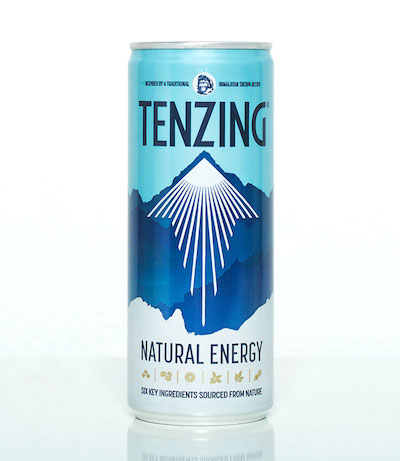
Tenzing was launched last year by former marketing director of Red Bull, Huib Van Bockel, who wanted to launch a low sugar, all natural energy drink.
Having left Red Bull to trek the Himalayas (as you do) Van Bockel came across a traditional energising brew used by the Himalayan Sherpa containing strong tea and salt.
Five per cent is enough to give you a lift; it’s the amount of sugar they put in IV drips
Intrigued, he worked with French physician Dr Michael Sagner, chairman of the European Society for Preventative Medicine, to find the optimal sugar levels for an energy drink. Together they came up with a drink containing five per cent sugar from beets. ‘Sugar is sugar is sugar and we wanted to be honest about that,’ he explains.
‘Five per cent is enough to give you a lift; it’s the amount of sugar they put in IV drips (as well as electrolytes) when you need some extra energy,’ says Van Bockel. ‘Five per cent is also defined as low sugar, so we went for it, adding Himalayan rock salt for electrolytes and lemon juice for natural flavouring as well as green coffee and guarana for the energy kick people expect from such drinks.’

Named after Tenzing Norgay, the Sherpa mountaineer who first climbed Everest with Sir Edmund Hillary in 1953, Van Bockel worked alongside Norgay’s son Jamling on the formula. Now, five per cent of the drink’s profits go back into a building new cleaner environment on the way to Everest.
Tenzing contain’s 4.9 per cent and only 55 calories in a can. That’s compared to 11 per cent sugar and 115 calories in 250ml of Red Bull Energy, 11.3 per cent sugar and 93 calories per 250ml Lucozade Energy and 11 per cent sugar and 208 calories in a 440ml can of Monster Energy.
As for the ingredients list – hearteningly short, pronouncable and all-natural. This is the entire list: sparkling water, beet sugar, lemon juice (from concentrate 4%), herbal extracts (green tea .12%), guarana (.02%), natural caffeine from green coffee, natural flavouring and Himalayan rock salt.
Tenzing contains electrolytes you would expect from an energy drink but they occur naturally from the Himalayan rock salt it contains. Likewise, it also contains L-Theanine, a key ingredient for clarity, concentration and focus but that occurs naturally in green tea.
As for the taste, because its low in sugar and doesn’t contain any other sweeteners, it strikes you at first as decidedly unsweet, almost like a non-alcoholic Prosecco (though it’s not fermented). It’s dry and citrusy and does provide a kick without a crash.
So, no one is saying don’t have the occasional energy drink. But just as you would with a can of beans, read the label first.
More Healthista content:
25 minute anti-ageing workout for balance and core strength
30 minute yoga for calming and toning
6 reasons why social media is making you unhappy
5 new healthy restaurants in London you will love
Like this article? Sign up to our newsletter to get more articles like this delivered straight to your inbox.



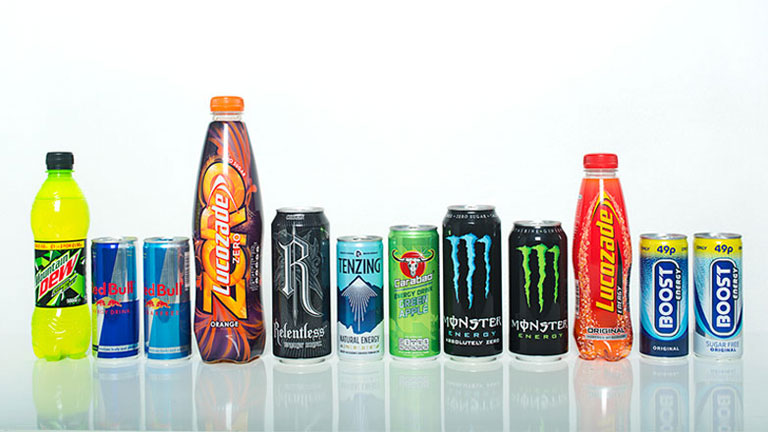
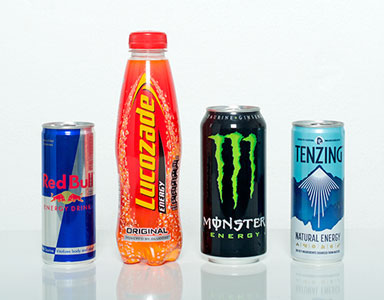 Not so good for weight loss
Not so good for weight loss